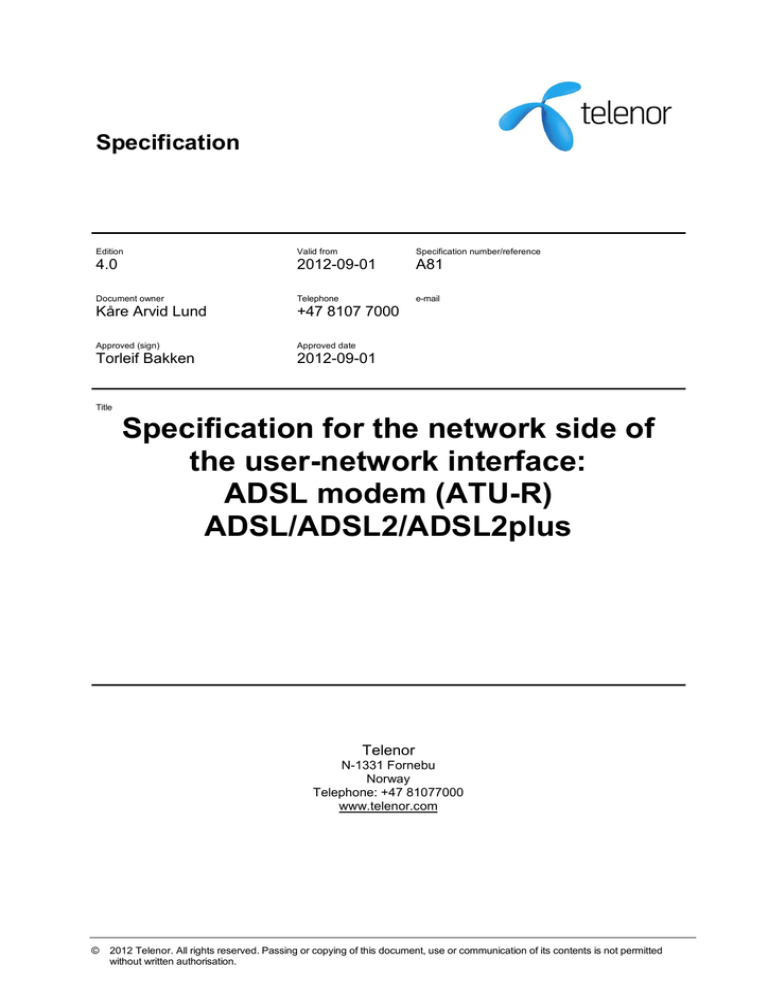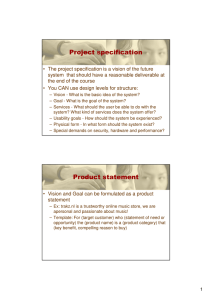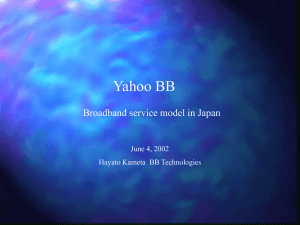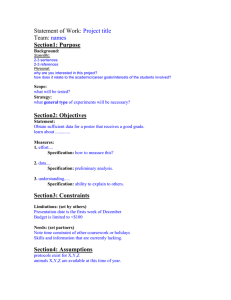
Specification
Edition
Valid from
Specification number/reference
4.0
2012-09-01
A81
Document owner
Telephone
e-mail
Kåre Arvid Lund
+47 8107 7000
Approved (sign)
Approved date
Torleif Bakken
2012-09-01
Title
Specification for the network side of
the user-network interface:
ADSL modem (ATU-R)
ADSL/ADSL2/ADSL2plus
Telenor
N-1331 Fornebu
Norway
Telephone: +47 81077000
www.telenor.com
©
2012 Telenor. All rights reserved. Passing or copying of this document, use or communication of its contents is not permitted
without written authorisation.
Title
Edition
A81: Specification for the network side of the user-network interface: ADSL
modem (ATU-R) ADSL/ADSL2/ADSL2plus
4.0
Page 2 of 13
Editions
©
Edition
01
Approved date
2003-03-01
Valid from date
2003-06-01
1.0
2004-06-02
2004-06-01
2.0
2005-05-23
2005-05-23
3.0
2010-05-01
2010-05-01
4.0
2012-09-01
2012-09-01
Comments
Deviating document
title/identity
ADSL2/ADSL2plus
included
Editorial updates
References to Nokia
D50e removed
2012 Telenor. All rights reserved. Passing or copying of this document, use or communication of its contents is not permitted
without written authorisation.
Title
Edition
A81: Specification for the network side of the user-network interface: ADSL
modem (ATU-R) ADSL/ADSL2/ADSL2plus
4.0
Page 3 of 13
Table of contents
1.
Scope ............................................................................................................................ 4
2.
2.1
2.2
References .................................................................................................................... 4
Normative references .................................................................................................... 4
Informative references .................................................................................................. 5
3.
3.1
Definitions .................................................................................................................... 6
Abbreviations ............................................................................................................... 6
4.
Requirements ................................................................................................................ 7
4.1
General ......................................................................................................................... 7
4.2
Transmission requirements ........................................................................................... 7
4.2.1
Electrical and functional requirements ............................................................................ 7
4.2.2
Frequency division multiplexing ..................................................................................... 8
4.2.3
ATM transport ................................................................................................................ 8
4.2.4
Interworking with Telenor’s ATU-C according to G.992.1 annex B ................................ 8
4.2.5
Interworking with Telenor’s ATU-C with ADSL2 or ADSL2plus functionality
(Optional) ..................................................................................................................................... 8
4.2.6
Performance ................................................................................................................... 9
4.2.7
Requirements for limitation of impact on PSTN/ISDN .................................................... 10
4.3
Management and configuration..................................................................................... 11
4.3.1
Vendor ID....................................................................................................................... 11
4.3.2
Dying gasp (Loss of power) ............................................................................................ 11
4.3.3
Fast channel .................................................................................................................... 11
4.3.4
Interleaved channel down ............................................................................................... 11
4.3.5
Interleaved channel up .................................................................................................... 11
4.4
ATM requirements ....................................................................................................... 11
4.4.1
Functionality ................................................................................................................... 11
4.4.2
F5 loop back ................................................................................................................... 11
4.4.3
VPI/VCI ......................................................................................................................... 11
4.5
Auxiliary requirements ................................................................................................. 11
4.5.1
No configuration needed ................................................................................................. 11
4.6
Physical interface and indicators ................................................................................... 11
4.6.1
Customer premise’s interface, U-R0 ................................................................................ 11
4.6.2
ADSL port, U-R2 (recommendations) ............................................................................ 12
4.6.3
Application interface, S/T (recommendations) ................................................................ 12
4.6.4
Indication, power status .................................................................................................. 12
4.6.5
Indication, link status ...................................................................................................... 12
4.6.6
Indication, link initialisation state (recommendations) ..................................................... 12
4.6.7
Indication, traffic status (recommendations) .................................................................... 12
4.7
Environmental requirements ......................................................................................... 12
4.7.1
CE-marking .................................................................................................................... 12
4.7.2
EMC ............................................................................................................................... 12
4.7.3
Resistibility..................................................................................................................... 13
4.7.4
Climatic and mechanical recommendations ..................................................................... 13
4.8
Electrical safety ............................................................................................................ 13
©
2012 Telenor. All rights reserved. Passing or copying of this document, use or communication of its contents is not permitted
without written authorisation.
Title
Edition
A81: Specification for the network side of the user-network interface: ADSL
modem (ATU-R) ADSL/ADSL2/ADSL2plus
4.0
Page 4 of 13
1. Scope
This specification describes the network side of ADSL access to the network of Telenor as
prescribed in Article 4.2 of RTT&E-directive [16]. The requirements in Telenor Specification
OA 100 [5] also apply.
This specification depicts requirements for an ADSL remote modem, ATU-R, interworking with
an ATU-C installed in Telenor’s DSLAM.
The objective is to ensure full interoperability between ADSL modems, ATU-C and ATU-R,
from different vendors and with different hardware chip sets.
With a remote splitter the ATU-R can coexist on the same access line as a connection to the
PSTN or to the ISDN network. The operation of PSTN or ISDN basic access in combination
with an ATU-R is made possible by the use of a non-overlapping frequency plan.
It is recommended that the vendor of ATU-R define a test regime to ensure compatibility
between the ATU-R and the network resources (ATU-C, DSLAM etc.).
NOTE:
Presently the focus is to have ATU-R from different vendors working together with ISDN compatible line
cards from:
Nokia D500 interface specification [1] or later releases
Alcatel interface specification [2] or later releases.
and
In no event shall Telenor be liable to other parties for any direct, indirect, special, incidental, or
consequential damages resulting from errors or defects in these specifications.
Functionality and performance regarding the local area network (LAN) or the data terminal
equipment (DTE) on the customer site are out of the scope for this specification; e.g. functions as
firewalls, DHCP, NAT etc. and interfaces like 10BaseT, USB, PCI, WLAN etc.
2. References
In case of any discrepancies between this specification and other specifications/standards
referred to, this specification applies.
2.1 Normative references
This specification incorporates by dated or undated references, provisions from other publications/standards. These normative references are cited at the appropriate places in the text and the
references are listed hereafter. For dated references, subsequent amendments to or revisions of
any of these publications apply to this specification only when incorporated in it by amendment
or revision. For undated references, including amendments, the last edition of the document
referred to applies.
[1]
Nokia D500 DSLAM Public Interface Specification, Interface Specification D500 R.
3.2.x, R2.4 onwards, May 19. 2005 or updated/revised
[2]
Alcatel 1000 ADSL (Asymmetric Digital Subscriber Line) and 7300 ASAM (Advanced
Services Access Manager), Network Compatibility Disclosure Document, ASAM Release 4.7/R4.7.05. (Dated December 23, 2004 or updated/revised)
[3]
Alcatel Lucent 7302 ISAM compliance with xDSL modems (Issue 1 - 2010)
[4]
Telenor Specification OA 105, Requirements for equipment to be connected to the local
loop in the access network of Telenor. Equipment providing ADSL and PSTN or ISDN
Basic Access services, full unbundled access (service type EAF)
©
2012 Telenor. All rights reserved. Passing or copying of this document, use or communication of its contents is not permitted
without written authorisation.
Title
Edition
A81: Specification for the network side of the user-network interface: ADSL
modem (ATU-R) ADSL/ADSL2/ADSL2plus
4.0
Page 5 of 13
http://www.jara.no
[5]
Telenor Specification OA 100, General requirements for equipment to be connected to
the local loop in the access network of Telenor and/or material and equipment to be installed and operated in Telelosji
http://www.jara.no
[6]
ITU-T Recommendation G.992.1 Transmission Systems And Media – Asymmetrical
Digital Subscriber Line (ADSL) Transceivers
[7]
ITU-T Recommendation G.992.3, Asymmetric digital subscriber line transceivers 2
(ADSL2)
[8]
ITU-T Recommendation G.992.5: Asymmetric Digital Subscriber Line (ADSL)
transceivers – Extended bandwidth ADSL2 (ADSL2plus)
[9]
ITU-T Recommendation G.994.1 Handshake procedures for Digital Subscriber Line
(DSL) transceivers
[10]
ITU-T Recommendation I.610 B-isdn operation and maintenance principles and
functions abstract
[11]
Telenor Specification A82: Specification for the network side of the user-network
interface: Remote splitter (PSTN/ISDN basic access)
[12]
ETSI ES 202 913 Access and Terminals (AT); POTS requirements applicable to ADSL
modems when connected to an analogue presented PSTN line
[13]
DSL Forum, Technical report TR-067, Issue 2, ADSL interoperability test plan,
December 2004.
[14]
DSL Forum, Working text TR-100, ADSL2/ADSL2plus Performance Test Plan.
[15]
ITU-T Recommendation K.21 Resistibility of telecommunication equipment installed in
customer’s premises to overvoltages and overcurrents
[16]
Directive R&TTE 1999/05/EEC: (The Radio Equipment and Telecommunications
Terminal Equipment)
http://ec.europa.eu/enterprise/sectors/rtte/documents/guidance/index_en.htm
[17]
CENELEC EN 60603-7:1996, Connectors for frequencies below 3 MHz for use with
printed boards – Part 7: Detail specification for connectors, 8 way, including fixed and
free connectors with common mating features (IEC 60603-7:1996)
[18]
CENELEC EN 60950 Safety of information technology equipment (IEC 60950)
2.2 Informative references
[19]
ETSI EN 300 019-1-1: Environmental Engineering (EE); Environmental conditions and
environmental tests for telecommunications equipment; Part 1-1: Classification of environmental conditions; Storage
[20]
ETSI EN 300 019-1-2: Environmental Engineering (EE); Environmental conditions and
environmental tests for telecommunications equipment; Part 1-2: Classification of environmental conditions; Transportation
©
2012 Telenor. All rights reserved. Passing or copying of this document, use or communication of its contents is not permitted
without written authorisation.
Title
Edition
A81: Specification for the network side of the user-network interface: ADSL
modem (ATU-R) ADSL/ADSL2/ADSL2plus
4.0
Page 6 of 13
[21]
ETSI EN 300 019-1-3: Environmental Engineering (EE); Environmental conditions and
environmental tests for telecommunications equipment; Part 1-3: Classification of environmental conditions; Stationary use at weatherprotected locations
[22]
ETSI TS 101 388 Transmission and Multiplexing (TM); Access transmission systems on
metallic access cables; Asymmetric Digital Subscriber Line (ADSL) – European specific requirements (ITU-T Recommendation G.992.1 modified)
[23]
Directive EMC 89/336/EEC etc.:
http://ec.europa.eu/enterprise/policies/european-standards/documents/harmonisedstandards-legislation/list-references/electromagnetic-compatibility/index_en.htm
[24]
Norwegian regulations:
http://www.lovdata.no/for/sf/sd/sd-20000620-0628.html
3. Definitions
ETSI FB noise
Line impairment type defined by ETSI. Details can be found in the ETSI TS 101 388
[22].
Synctime
“Synctime” is the time interval from the moment when the modem starts training, until
the moment the state “showtime” is achieved.
Showtime
“Showtime” is the state reached after training is completed and data can be transmitted.
ADSL access
Access line fitted with ADSL transmission equipment supporting ITU-T recommendations G.992.1, G.992.3, G.992.5 or other ADSL (pre-) standards.
3.1 Abbreviations
ADSL
ASAM
ATM
ATU
ATU-C
ATU-R
CPE
DHCP
DSLAM
DTE
ETSI
ISDN
ITU-T
NAT
nrt-VBR
OAM
PC
PCI
PSTN
PVC
TE
UBR
UBR+
USB
VBR.3
©
Asymmetric digital subscriber line
ATM subscriber access multiplexer (DSLAM)
Asynchronous transfer mode
ADSL Transceiver Unit
ATU at the central office end (i.e network operator)
ATU at the remote terminal end (i.e Customer Premises)
Customer Premises Equipment (usually an ATU-R and splitter)
Dynamic host configuration protocol
Digital subscriber line access multiplexer (usually housing the ATU-C)
Data terminal equipment
European Telecommunications Standards Institute
Integrated services digital network
International Telecommunication Union – Telecommunication sector
Network address translation
Non-real-time variable bit rate
Operation, administration and maintenance
Personal computer
Peripheral component interconnect
Public switched telephone network
Permanent virtual connection
Terminal equipment
Unspecified bit rate
UBR with minimum cell rate (MCR) specified
Universal serial bus
Conformance definition according to ATM Forum TM4.0. (Cells above SCR but
within PCR shall be tagged)
2012 Telenor. All rights reserved. Passing or copying of this document, use or communication of its contents is not permitted
without written authorisation.
Title
Edition
A81: Specification for the network side of the user-network interface: ADSL
modem (ATU-R) ADSL/ADSL2/ADSL2plus
4.0
VCI
VPI
WLAN
Page 7 of 13
Virtual channel identifier
Virtual path identifier
Wireless local area network
4. Requirements
4.1 General
Requirements in order to obtain interoperability are considered to be mandatory. The equipment
is compliant to this specification if all mandatory requirements are fully compliant.
Some statements may be considered optional or recommended if stated in the heading. Noncompliance to statements indicated as ‘optional’ or ‘recommended’ does not exclude compliance
to this specification.
The ATU-R shall comply with the generic specification, Telenor Specification OA 100 [5].
This specification depicts functionality and performance regarding the ATU-R and its interaction
with the ATU-C hosted in the DSLAM in figure 1. The ATU-C is the counterpart to the ATU-R.
In figure 1 the equipment located at the customer premises consists of a universal remote
PSTN/ISDN splitter and a modem designated ATU-R. The ATU-R is in turn attached to a data
terminal equipment (DTE) or a local area network (LAN) domain.
Customer's premises
PSTN/ ISDN
network
Pkl FoU-Lsm 20040602-1
PSTN or ISDN
exchange
U-R2
U-R2A
Service
provider
Broadband
infra
structure
Video
server
DSLAM
Local loop
access network
ATM
Service
provider
ATU-C
Modem s
DTE
ATU-R
ADSL modem
(ATM)
Remote
splitter
LAN
S/T
Splitters
U-R0
PSTN or ISDN
U-R
PSTN/ISDNR
Figure 1 ADSL system functionality
The ATU-R may be a stand-alone unit or it may be an integrated part of a DTE. The DTE may
be a PC or a router connected to LAN.
If PSTN or ISDN services are provided on the same pair the provision of a splitter is mandatory.
Requirements for the splitter are given in the Telenor Specification A82: Specification for the
network side of the user-network interface: Remote splitter (PSTN/ISDN basic access) [11].
4.2 Transmission requirements
The support of ADSL (i.e. ITU-T Rec. G.992.1) is mandatory.
The support of ADSL2 is optional.
The support of ADSL2plus is optional.
4.2.1 Electrical and functional requirements
The ATU-R shall comply with Telenor Specification OA 105 [2].
©
2012 Telenor. All rights reserved. Passing or copying of this document, use or communication of its contents is not permitted
without written authorisation.
Title
Edition
A81: Specification for the network side of the user-network interface: ADSL
modem (ATU-R) ADSL/ADSL2/ADSL2plus
4.0
Page 8 of 13
ITU-T Rec. G.992.1 [6] Annex B defines the minimal set of requirements to provide satisfactory
transmission between the network and the customer interface. The physical layer aspects
required ensuring the compatibility between the network and the ATU-R at customer premises
are specified.
4.2.1.1 ADSL2 and ADSL2plus (optional)
ITU-T Rec. G.992.3 [7] Annex B defines the minimal set of requirements to provide satisfactory
transmission between the network and the customer interface.
ADSL2: Requirements in both Alcatel interface specification [2] or [3] and in Nokia D500
interface specification [1] regarding ITU-T Rec. G.992.3 Annex B [7] shall apply.
ADSL2plus: Requirements in both Alcatel interface specification [2] or [3] and in Nokia D500
interface specification [1] regarding ITU-T Rec. G.992.5 Annex B [8] shall apply.
4.2.2 Frequency division multiplexing
ATU-R shall use frequency division multiplexing (FDM). See appropriate recommendations (i.e.
according to ITU-T Rec. G.992.1 [6], G.992.3 [7]).
4.2.3 ATM transport
The equipment shall transport ATM cells over ADSL. See appropriate recommendations (i.e.
according to ITU-T Rec. G.992.1 [6], G.992.3 [7]). For cell transport, the ATM-specific parts
shall apply.
4.2.3.1 ADSL2 and ADSL2plus (optional)
ADSL2/ADSL2plus: Requirements in both Alcatel interface specification [2] and in Nokia D500
interface specification [1] regarding ITU-T Rec. G.992.3 [7] (or ITU-T Rec. G.992.5 [8]) shall
apply.
4.2.4 Interworking with Telenor’s ATU-C according to G.992.1 annex B
The bit transport using ATM over ADSL is presently supplied by two vendors of ATU-C;
Alcatel or Nokia. The ATU-R shall comply with both vendors, according to 4.2.4.1, 4.2.4.2 Feil!
Fant ikke referansekilden. and 4.2.4.3.
4.2.4.1 Compatibility for Alcatel 1000 and 7300 with ISDN compatible line cards
The ATU-R shall interwork with the ATU-C depicted in Alcatel interface specification [2]
regarding ITU-T Recommendations.
4.2.4.2 Compatibility for Alcatel Lucent ISAM 7302 ISDN compatible line cards
The ATU-R shall interwork with the ATU-C as defined in Alcatel Lucent 7302 ISAM compliance with xDSL modems [3] regarding ITU-T Recommendations.
4.2.4.3 Compatibility for Nokia D500 ISDN compatible line cards
The ATU-R shall interwork with the ATU-C depicted in Nokia D500 interface specification [1].
4.2.5 Interworking with Telenor’s ATU-C with ADSL2 or ADSL2plus functionality
(Optional)
When ADSL2 or ADSL2plus functionality is provided, the requirements in both 4.2.5.1 and in
4.2.5.2 shall apply.
©
2012 Telenor. All rights reserved. Passing or copying of this document, use or communication of its contents is not permitted
without written authorisation.
Title
Edition
A81: Specification for the network side of the user-network interface: ADSL
modem (ATU-R) ADSL/ADSL2/ADSL2plus
4.0
Page 9 of 13
4.2.5.1 Compatibility for Alcatel 7300 with ISDN compatible line cards
ADSL2/ADSL2plus: The ATU-R shall interwork with the ATU-C depicted in Alcatel interface
specification [2] regarding respectively ITU-T Rec. G.992.3 Annex B [7] or ITU-T Rec. G.992.5
Annex B [8].
4.2.5.2 Compatibility for Nokia D500 with ISDN compatible line cards
The ATU-R shall interwork with the ATU-C depicted in Nokia D500 interface specification [1]
regarding respectively ITU-T Rec. G.992.3 Annex B [7] or ITU-T Rec. G.992.5 Annex B [8].
4.2.6 Performance
The bit rate requirements shall apply with a remote splitter attached. The splitter shall conform to
the requirements in the Telenor Specification A82: Specification for the network side of the usernetwork interface: Remote splitter (PSTN/ISDN basic access) [11].
The conformance testing related to ADSL (i.e. ITU Rec. G.992.1) shall be performed respecting
conditions in TR-067 [13] and clauses 4.2.4.1, Feil! Fant ikke referansekilden. and 4.2.4.3.
The conformance testing related to ADSL2 and ADSL2plus shall be performed respecting
conditions in WT-100 [14] and clauses 4.2.5.1 and 4.2.5.2.
Requirements for downstream capacity are contained in table 4.1 and requirements for upstream
capacity are contained in table 4.2.
Figure 2 Rate-reach mask
4.2.6.1 Downstream bit rate
Point
(Figure 2)
Reach
(m)
ADSL (G.992.1)
(kbit/s)
ADSL2
(kbit/s)
ADSL2plus
(kbit/s)
A
100
B
1000
C
2000
D
2750
5 024
6 720
3 520
128
5 230
7 296
4 160
224
16 256
13 024
5 152
224
TR-067 [13]
See clauses 4.2.4.1,
Feil! Fant ikke
referansekilden.
TR-100 [14]
See clauses 4.2.5.1
and 4.2.5.2
TR-100 [14]
See clauses 4.2.5.1
and 4.2.5.2
Test conditions
©
2012 Telenor. All rights reserved. Passing or copying of this document, use or communication of its contents is not permitted
without written authorisation.
Title
Edition
A81: Specification for the network side of the user-network interface: ADSL
modem (ATU-R) ADSL/ADSL2/ADSL2plus
4.0
Page 10 of 13
and 4.2.4.3
Table 4.1 Downstream bit rate
4.2.6.2 Upstream bit rate
Point
(Figure 2)
Reach
(m)
ADSL (G.992.1)
(kbit/s)
ADSL2
(kbit/s)
ADSL2plus
(kbit/s)
A
100
B
1000
C
2000
D
2750
768
768
480
128
768
768
480
128
768
768
480
128
TR-067 [13]
See clauses 4.2.4.1,
Feil! Fant ikke
referansekilden.
and 4.2.4.3
TR-100 [14]
See clauses 4.2.5.1
and 4.2.5.2
TR-100 [14]
See clauses 4.2.5.1
and 4.2.5.2
Test conditions
Table 4.2 Upstream bit rate
4.2.6.3 Synctime
The synctime shall be less than 1 minute. The synctime shall be measured at the points given in
according to 4.2.6.1 and 4.2.6.2.
4.2.7 Requirements for limitation of impact on PSTN/ISDN
The requirements in this clause are based on ETSI ES 202913 [12].
Scenario 1 in ES 202913 [12] clause 4 is most likely to be used.
4.2.7.1 Polarity
Requirements in ES 202913 [12] clause 4.1 shall apply.
4.2.7.2 DC resistans
Requirements in ES 202913 [12] clause 4.2 shall apply.
4.2.7.3 Ringing impedance
Requirements in ES 202913 [12] clause 4.3 shall apply.
4.2.7.4 Transient response
Requirements in ES 202913 [12] clause 4.4 shall apply.
4.2.7.5 DC ringing current
Requirements in ES 202913 [12] clause 4.5 shall apply.
4.2.7.6 Impedance unbalance about earth
Requirements in ES 202913 [12] clause 4.6 shall apply.
4.2.7.7 DC resistance to earth
Requirements in ES 202913 [12] clause 4.7 shall apply.
©
2012 Telenor. All rights reserved. Passing or copying of this document, use or communication of its contents is not permitted
without written authorisation.
Title
Edition
A81: Specification for the network side of the user-network interface: ADSL
modem (ATU-R) ADSL/ADSL2/ADSL2plus
4.0
Page 11 of 13
4.2.7.8 Impedance for PSTN voice band (200 Hz – 4 000 Hz)
Requirements in ES 202913 [12] clause 4.8.1 shall apply.
4.2.7.9 Impedance for metering pulses (12 kHz and 16 kHz)
Requirements in ES 202913 [12] clause 4.8.2 shall apply.
4.3 Management and configuration
4.3.1 Vendor ID
The ATU-C should be able to identify the vendor of the remote ATU-R. The data in the vendor
ID information block should be available as specified in ITU-T Rec. G.994.1 [9].
4.3.2 Dying gasp (Loss of power)
The ATU-R should be able to detect when the electrical power has been shut off according to
ITU-T Rec. G.992.1 [6] or ITU-T Rec. G.992.3 [7].
4.3.3 Fast channel
The ATU-R shall have a channel for fast transmission of data in both directions.
4.3.4 Interleaved channel down
The ATU-R shall in direction towards the customer have an interleaved channel that supports
transmission of interleaved data with an interleaved depth of 8 or more.
4.3.5 Interleaved channel up
The ATU-R shall in direction towards the network have an interleaved channel that supports
transmission of interleaved data with an interleaved depth of 4 or more.
4.4 ATM requirements
4.4.1 Functionality
The present ATM service categories supported by Telenor are UBR.1, UBR+ and nrt-VBR with
conformance VBR.3.
4.4.2 F5 loop back
The ATM OAM F5 end-to-end or segment loop-back functionality at virtual channel level
according to ITU-T Rec. I.610 [10] shall be supported.
4.4.3 VPI/VCI
At least one PVC shall be preconfigured:
VPI/VCI = 8/35.
4.5 Auxiliary requirements
4.5.1 No configuration needed
Before customer installation and start up, no configuration of the ATU-R defining parameters
specified by mandatory requirements in this technical specification shall be necessary.
4.6 Physical interface and indicators
4.6.1 Customer premise’s interface, U-R0
The cord connecting the CPE to the access network shall be equipped with a plug mating a
socket according to EN 60603-7 [17] (RJ45).
©
2012 Telenor. All rights reserved. Passing or copying of this document, use or communication of its contents is not permitted
without written authorisation.
Title
Edition
A81: Specification for the network side of the user-network interface: ADSL
modem (ATU-R) ADSL/ADSL2/ADSL2plus
4.0
Page 12 of 13
The wall socket (or equivalent female connector) complies with EN 60603-7 [17] (RJ45).
Signals are present on pins 4 and 5.
4.6.2 ADSL port, U-R2 (recommendations)
Vendor’s preference.
If the splitter functions are integrated within the ADSL modem (in ATU-R) the interfaces U-R2
and U-R2A may not be present as external interfaces.
With RJ45 connectors on all or most of the interfaces (U-R, U-R2A,, U-R0 and PSTN/ISDNR), it
is more convenient to adapt different lengths of relevant interconnecting cords. In this case pins
4 and 5 should be used.
See also Telenor Specification A82: Specification for the network side of the user-network
interface: Remote splitter (PSTN/ISDN basic access) [11].
4.6.3 Application interface, S/T (recommendations)
Connecting hardware may be selected to suite the relevant applications as indicated in clause 4.1,
General.
4.6.4 Indication, power status
The ATU-R shall indicate presence of power.
4.6.5 Indication, link status
The ATU-R shall indicate the following status:
- ADSL link not available
- ADSL link available
4.6.6 Indication, link initialisation state (recommendations)
The ATU-R should indicate presence of link initialisation state (training).
4.6.7 Indication, traffic status (recommendations)
The ATU-R should indicate presence of ADSL link traffic.
4.7 Environmental requirements
4.7.1 CE-marking
Equipment shall comply with requirements specified in order to obtain the CE marking.
4.7.2 EMC
The EU directives concerning EMC are in force and conformance to these EU directives is
mandatory. The EU directives are made legal also in Norway (1989/366/EØF, 1991/263/EØF,
1993/97/EØF, 1992/31/EØF, 1993/68/EØF, 1999/05/EØF).
For requirements in Norwegian regulations, see the relevant EEC directives:
http://ec.europa.eu/enterprise/policies/european-standards/documents/harmonised-standardslegislation/list-references/rtte/index_en.htm
©
2012 Telenor. All rights reserved. Passing or copying of this document, use or communication of its contents is not permitted
without written authorisation.
Title
Edition
A81: Specification for the network side of the user-network interface: ADSL
modem (ATU-R) ADSL/ADSL2/ADSL2plus
4.0
Page 13 of 13
4.7.3 Resistibility
4.7.3.1 Gas discharge tubes
The provision of gas discharge tubes is not mandatory. If gas discharge tubes are provided, the
requirements in Telenor Specification OA 100 [5] clause 6.3 shall apply.
4.7.3.2 Protection (recommendations)
The major power distribution system in Norway is the IT-system, which is more susceptible for
electromagnetic disturbances. It is recommended that equipment connected to both telecommunication lines and to mains shall resist lightning pulses of 10 kV (instead of 4/6 kV as stated in
K.21 [15]).
4.7.4 Climatic and mechanical recommendations
The modems (ATU-R) will typically be ordered in large quantities and distributed by one and
one unit by public transportation.
4.7.4.1 Storage (recommendations)
Requirements in EN 300019-1-1 class 1.2 [19] apply for storage. Humidity is normally not
controlled.
4.7.4.2 Transportation (recommendations)
Requirements in EN 300019-1-2 class 2.3 [20] apply for public transportation.
4.7.4.3 Operational (recommendations)
Requirements in EN 300019-1-3 class 3.2 [21] apply for stationary use at weather-protected
locations. Equipment may be exposed to direct sunshine and humidity is normally not controlled.
It is recommended that the equipment may operate over the temperature range of +5ºC to +55ºC.
4.8 Electrical safety
Requirements in CENELEC EN 60950 [18] apply in general.
Requirements in Norwegian regulations [24]: http://www.lovdata.no/cgi-wift/ldles?doc=/sf/sf/sf20000620-0628.html
©
2012 Telenor. All rights reserved. Passing or copying of this document, use or communication of its contents is not permitted
without written authorisation.




